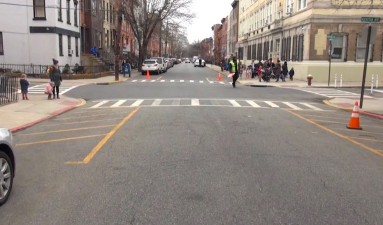As Jersey City and Hoboken Fight Over Bike-Share, Everyone Loses

A dispute between Hoboken and Jersey City is making the decision to operate separate bike-share systems in each city look even worse.
In late 2013, the two cities — along with neighboring Weehawken — announced plans for a combined bike-share system, called Hudson Bike Share. At first Hudson Bike Share was envisioned as a “smart lock” system that allows users to dock their bikes anywhere (unlike New York’s Citi Bike and most other bike-share systems, where users dock at stations with fixed locations).
Teaming up made a lot of sense, since the cities cover a relatively small geographic area no larger than the initial Citi Bike service zone. Unfortunately, things fell apart. As the Hudson Bike Share rollout dragged on, Weehawken withdrew completely. Hoboken went ahead with a smart lock system, while Jersey City opted for the same platform as Citi Bike, giving members access to New York City’s bike-share network as well.
The decision to run separate systems for each city was deeply flawed, according to TransitCenter’s Jon Orcutt. “The keys to high ridership bike-share are scale and density,” he said, “so obviously having two different systems in adjacent small cities, you’re automatically sacrificing on scale.”
As soon as Jersey City Mayor Steven Fulop and Hoboken Mayor Dawn Zimmer failed to agree on a shared system, they limited the usefulness of each bike-share network to their constituents.
“It seems that some of the things that are going on right now between the two municipalities are creating difficulties for customers of both bike-shares,” Tri-State Transportation Campaign New Jersey Director Janna Chernetz told Streetsblog. “Bike-share should be improving connectivity and improving access to the ability to live car-free, either by choice or by economics.”
For north Jersey towns and cities, that would be best accomplished by setting aside differences and reviving the multi-city approach. But with contracts signed and bikes on the street, Jersey City and Hoboken are probably stuck, at least for the near future.
Cyndi Steiner of the New Jersey Bike and Walk Coalition has proposed steps the two cities could take to making the best of a bad situation. She argues that an agreement allowing each bike-share provider to install a set number of docks in the other city would benefit both cities. “These riders don’t just bring their bikes; they also bring their wallets,” Steiner wrote.
Few parts of the country have so many densely-populated and interdependent cities as Hudson County, Steiner noted. If north Jersey electeds want bike-share to work well in their cities, they’ll need to coordinate across city borders.

